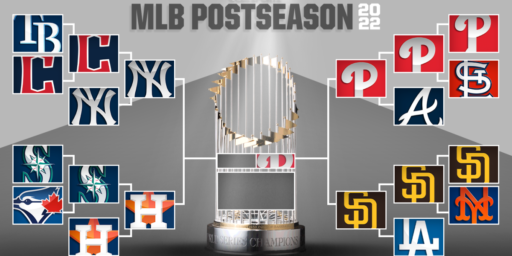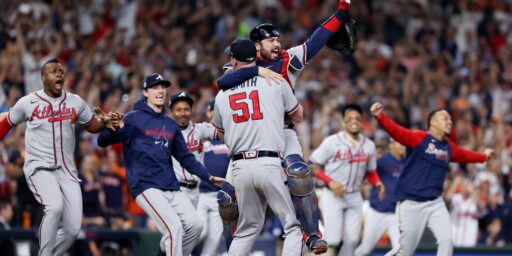BASEBALL NEEDS CHANGES
I tuned in just in time for the 7th inning of last night’s BoSox-Yankees game. Like Steven, I thought the Sox had it won. But, like the Cubbies, they managed once again to find a way to lose.
What’s particularly annoying to me is that we once again have a wild card team in the World Series. Had the Sox not left Pedro in when he was obviously out of gas, we’d have the second consecutive all-wild card Series.
Baseball has the longest regular season by far of any of the team sports, yet also the system in which the regular season is most meaningless. In the NFL, for example, the teams with the best regular season records in each conference get a first round bye and then home field advantage. But the only advantage an MLB division champion gets over a wild card team is they get to play the deciding game of a five game series, if it comes to that, at home. Given how little home field matters in baseball, that’s not much. Indeed, it’s sufficiently meaningless that the San Francisco Giants forfeited a makeup game at the end of the season that would have given them a shot at home field in the NLCS, preferring instead to set their rotation for the NLDS.
Not only is the reward for winning in the regular season small indeed, but success in the regular season also has less correlation with postseason success than in the other sports. It’s rare for an NFL team that went 13-3 in the regular season to lose a playoff game to a team that snuck into the playoffs with a 9-7 record. Barring injuries key players or freakish weather, regular season and postseason football are the same games. Not so in baseball. The Atlanta Braves, for example, have been a regular season phenomenon for over a decade, building their team around a strong starting rotation and solid offense. That’s a great formula for a 162 game season with few off days. But the key to postseason victory is to have two hot starting pitchers, an excellent closer, and a bit of luck. In a five game division series, two dominant pitchers can pitch four of the five games because of travel days.
MLB should either radically shorten its meaningless regular season or render it more meaningful by changes of the postseason format. For one thing, I’d make the division series seven games. A five game series is simply unfair to the dominant team. Further, I’d give the team playing the wild card true home field advantage: the entire series would be played in their home stadium. Along with that, I’d eliminate the idiotic rule that a division champion can’t play the wild card team in the opening round if it’s from the same division. The team with the best record should play the team with the worst record, period.
Cross-post at SportsBlog





While the Wild Card issues doesn’t bother me, per se. I agree with the following:
-Shortening the season(it goes one forever–especially if one is a Rangers fan).
-Expanding the divisional series to 7
-I agree on the Div Champ playing the team with the worst record.
-The home field idea is worth considering.
Anyone have Bud Selig’s cell number?
Indeed on the Rangers angle.
I don’t mind the wild card per se–I was in favor of it when it came out. I remember the 1993 season when the Braves won 104 games and the Giants 103. That was in the two division days, so the Giants stayed home. The Braves and Phillies, who won 80-odd games, went to the NLCS. The Giants clearly got hosed.
My main concern is that there should be more reward for winning in the regular season if the season is going to be this danged long.
Lets remember that the Marlins (91 wins) had more wins than the Cubs (88) during the regular season. The Red Sox (95 wins) had more wins than the Twins (90) and were just a game back of Oakland (96).
Also since Trader Jack took over the Marlins had a .631 winning percentage, better than both the Braves and the Giants.
Note the Yankees had few problems with the Twins. And this was a matchup of the team with the best record in the league playing the team with the worst. In the National League the Braves (best record) played the Cubs (worst record.)
And please don’t start with the problems of the Braves in the post season. As we saw with the Cubs and the Red Sox, the post season is the time when your manager and his choices can have the most effect on the outcomes of a series. And Bobby Cox has one of the worst post season records, and record in 1-run games, of any manager in baseball. But that is another discussion.
As for your NFL analogy, it is not uncommon for the team with the best winning percentage to fail to make it to the Super Bowl. (Tennessee (13 wins) 2000, Pittsburgh and Chicago (both 13 wins) in 2001, St. Louis (14 wins) lost to New England (11 wins) in the 2001 Superbowl. In 2002 Philly and Green Bay had 12 wins, and Tennessee had 11, (Philly even had home field over the Bucs.) Oh and Green Bay lost to Atlanta (9 wins).
Back to baseball. As much as I would have liked to have seen the Cubs v Red Sox, the Yankees v Marlins feature the best two teams in baseball.
Just because they are a wild card does not mean they don’t belong.
I don’t agree that the wildcard is necessarily less deserving of the playoffs than the team that won its division. After all, the Marlins won four more games than my beloved Cubbies, yet only made the playoffs because of the wildcard.
A greater unfairness might be the fact that you can get into the playoffs from the AL West by being the best of four teams, whereas the NL Central champ has to be the best of six.
It’s true that upsets happen in the NFL. They’re more rare, though. And they’re usually in the late rounds.
You both make a good point about the wild card team versus a division champ with an inferior record. Indeed, the Giants getting left home despite 103 wins back in 1993 was one of the reasons I supported the system to begin with. But the five game division series makes the road to the LCS much more a matter of luck and not enough reward for regular season winning and overall team depth.
I agree that Bobby Cox has made some boneheaded decisions in the postseason. But, mainly, I think the team just isn’t built for the postseason. This year’s team greatly overachieved in the regular season, with several players greatly exceeding their projections. Cox deserves some of the credit for that.
I agree that the Marlins are probably the hottest team in baseball right now. But the Giants and Braves were both better teams over the course of 162 games. If you’re going to have a system that gives so little reward to winning that marathon, reduce it to, say, 100 games.
I like some of your ideas, but you do understate the importance of the regular season. Baseball’s regular season is a bigger factor than the NFL’s, just because it knocks out more teams. Only 8 teams of 30 make the playoffs, as opposed to the NFL’s 12 out of 32. The worst offender is the NBA, which plays an overlong season solely for the purpose of eliminating Cleveland and the Clippers, then runs about 6 more months of playoffs.
True on the NBA. But at least winning home court advantage seems to matter a lot there–unless you’re the Denver Nuggets.
hello… a wild card team WON the world series last year
Anyway the simple solution is to give home field to
the team with the better record instead of the
stupid all star game idiocy.
Selig is an idiot.
Mel,
Last year, both teams in the Series were wild card teams, so one had to win! And the Marlins did it in 1997 as a wild card.